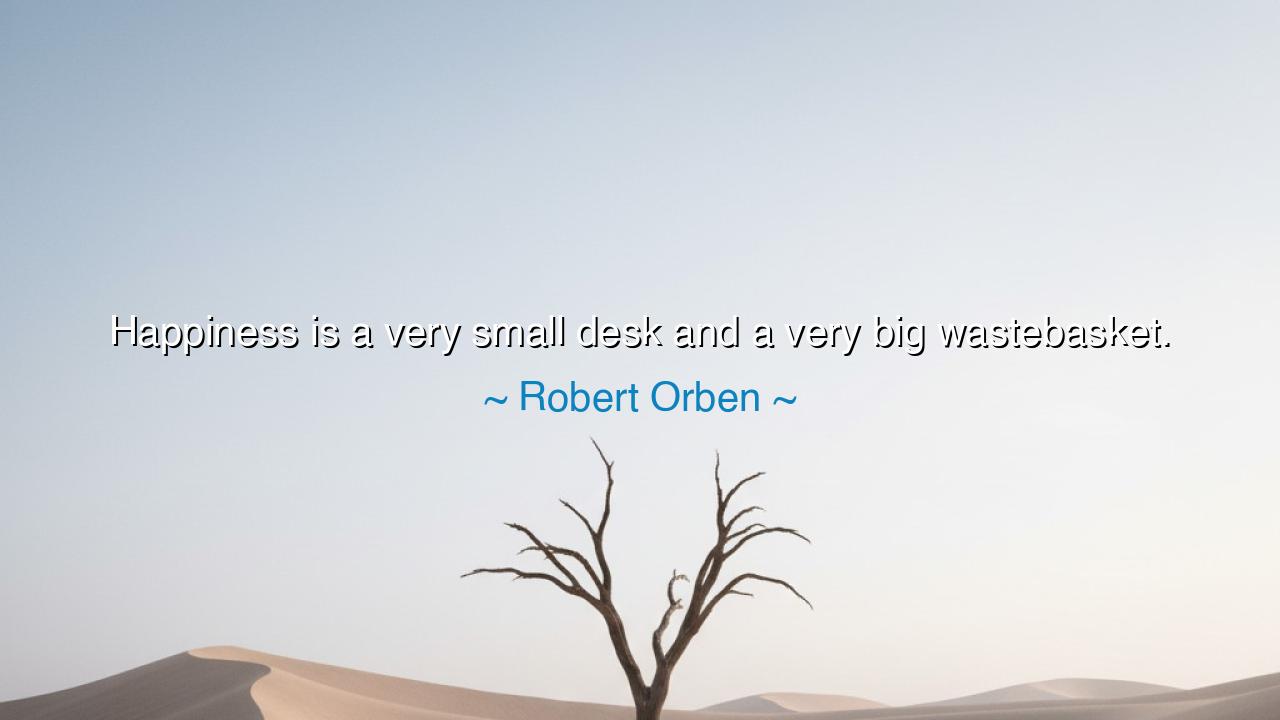
Happiness is a very small desk and a very big wastebasket.






The humorist Robert Orben, a man who understood the spirit of modern life with both wit and wisdom, once said: “Happiness is a very small desk and a very big wastebasket.” At first glance, these words seem light and amusing—a simple reflection on clutter and cleanliness. But beneath the laughter lies a truth as ancient as discipline itself: that happiness is born from simplicity, and that the soul finds its peace not in accumulation, but in the art of letting go. Orben, though a master of comedy, spoke here as a philosopher. He knew that what burdens us is rarely the lack of things, but the excess of what no longer serves us—the thoughts, possessions, and worries that crowd the space where peace might dwell.
The small desk symbolizes clarity of purpose. It is a sacred place, humble in size but vast in meaning, where one works, thinks, and creates without distraction. In the smallness of the desk lies discipline—the focus of a mind that knows what matters and what does not. To have a small desk is to say: “I will give my attention only to what is worthy of it.” It is the posture of simplicity, the stance of wisdom. The wise of every age have known this truth. The monk has his cell, the scholar his table, the artist his easel—each a small and sacred space where creation breathes and chaos ends. So too must we keep our “desks” in life—our minds, our work, our relationships—free from clutter, so that our purpose may unfold without confusion.
The big wastebasket, in turn, represents the courage to discard. To throw away what is unnecessary is not a loss, but a liberation. It takes strength to let go—of papers, of possessions, of ideas that once served us but now weigh us down. Orben’s metaphor speaks beyond the literal desk; it reaches into the heart. For the truest wastebasket is not made of metal or wood, but of resolve—the inner will to cast aside resentment, regret, and fear. Happiness, he reminds us, is not found in what we keep, but in what we release. To be able to say, “This no longer belongs to me,” is to reclaim one’s life from the grip of the unnecessary.
The ancients understood this principle deeply. Diogenes of Sinope, the Greek philosopher, lived in a barrel and owned almost nothing. When he saw a child drinking water with his hands, he threw away his cup, saying, “Even this is more than I need.” Though his simplicity was extreme, it carried a profound truth: that freedom is the child of renunciation. The more one owns, the more one must defend; the more one clings to, the less one can breathe. Even emperors who sat on golden thrones knew no peace, while those who walked barefoot under the sun often carried laughter in their hearts. The big wastebasket of Orben’s wisdom is not a tool of destruction—it is an altar of renewal.
In the world of modern life, where desks are large and wastebaskets small, this teaching feels more urgent than ever. Our days are crowded with tasks, our homes with objects, our minds with noise. We worship productivity, yet seldom find contentment. Orben’s words remind us to turn the balance: to make our workspace, and by extension our life, lean and clear. Imagine a desk holding only what you need for the day’s work—the essential tools, the paper, the light. Around you, space to breathe. In the corner, a great basket—ready to receive the fragments of distraction, the false urgencies, the unfinished worries. This is not merely organization; it is spiritual hygiene.
But beyond the literal, Orben’s quote also speaks to the heart’s organization. How often do we clutter our spirits with the debris of old anger, self-doubt, or comparison? To “empty the wastebasket” is to forgive, to forget, to choose peace over perfection. Every day, the wise man cleans not only his desk but his heart. He casts away envy, pride, and fear, until all that remains is the quiet joy of being alive. Thus, happiness becomes not a prize to be earned, but a space to be cleared, a light revealed when the dust has settled.
So, my children of thought and creation, take this teaching to heart: Keep your desk small, and your wastebasket vast. Simplify your surroundings, your schedule, your soul. Keep close only what serves your growth—ideas that inspire, people who uplift, work that nourishes the spirit. And each day, cast into the wastebasket what clings without purpose: the trivial, the toxic, the tired remnants of yesterday. For happiness, as Robert Orben teaches, is not found in having more—but in needing less, and cherishing the little that truly matters. When your life is clear and your heart unburdened, you will find that even the smallest desk can hold the vastness of joy.






AAdministratorAdministrator
Welcome, honored guests. Please leave a comment, we will respond soon